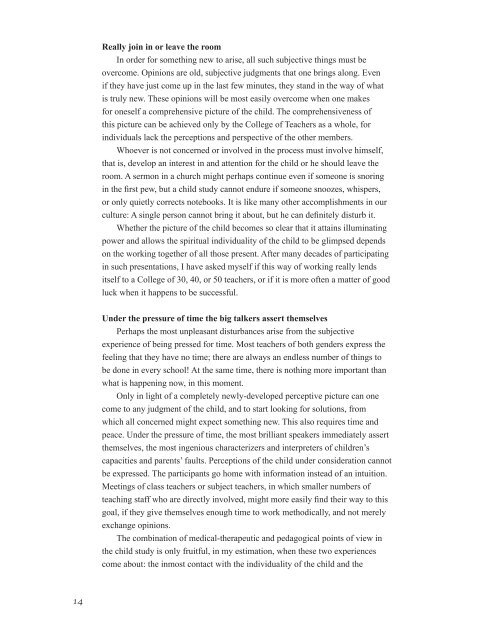Observing the Class Observing the Children - Research Institute for ...
Observing the Class Observing the Children - Research Institute for ...
Observing the Class Observing the Children - Research Institute for ...
You also want an ePaper? Increase the reach of your titles
YUMPU automatically turns print PDFs into web optimized ePapers that Google loves.
14<br />
Really join in or leave <strong>the</strong> room<br />
In order <strong>for</strong> something new to arise, all such subjective things must be<br />
overcome. Opinions are old, subjective judgments that one brings along. Even<br />
if <strong>the</strong>y have just come up in <strong>the</strong> last few minutes, <strong>the</strong>y stand in <strong>the</strong> way of what<br />
is truly new. These opinions will be most easily overcome when one makes<br />
<strong>for</strong> oneself a comprehensive picture of <strong>the</strong> child. The comprehensiveness of<br />
this picture can be achieved only by <strong>the</strong> College of Teachers as a whole, <strong>for</strong><br />
individuals lack <strong>the</strong> perceptions and perspective of <strong>the</strong> o<strong>the</strong>r members.<br />
Whoever is not concerned or involved in <strong>the</strong> process must involve himself,<br />
that is, develop an interest in and attention <strong>for</strong> <strong>the</strong> child or he should leave <strong>the</strong><br />
room. A sermon in a church might perhaps continue even if someone is snoring<br />
in <strong>the</strong> first pew, but a child study cannot endure if someone snoozes, whispers,<br />
or only quietly corrects notebooks. It is like many o<strong>the</strong>r accomplishments in our<br />
culture: A single person cannot bring it about, but he can definitely disturb it.<br />
Whe<strong>the</strong>r <strong>the</strong> picture of <strong>the</strong> child becomes so clear that it attains illuminating<br />
power and allows <strong>the</strong> spiritual individuality of <strong>the</strong> child to be glimpsed depends<br />
on <strong>the</strong> working toge<strong>the</strong>r of all those present. After many decades of participating<br />
in such presentations, I have asked myself if this way of working really lends<br />
itself to a College of 30, 40, or 50 teachers, or if it is more often a matter of good<br />
luck when it happens to be successful.<br />
Under <strong>the</strong> pressure of time <strong>the</strong> big talkers assert <strong>the</strong>mselves<br />
Perhaps <strong>the</strong> most unpleasant disturbances arise from <strong>the</strong> subjective<br />
experience of being pressed <strong>for</strong> time. Most teachers of both genders express <strong>the</strong><br />
feeling that <strong>the</strong>y have no time; <strong>the</strong>re are always an endless number of things to<br />
be done in every school! At <strong>the</strong> same time, <strong>the</strong>re is nothing more important than<br />
what is happening now, in this moment.<br />
Only in light of a completely newly-developed perceptive picture can one<br />
come to any judgment of <strong>the</strong> child, and to start looking <strong>for</strong> solutions, from<br />
which all concerned might expect something new. This also requires time and<br />
peace. Under <strong>the</strong> pressure of time, <strong>the</strong> most brilliant speakers immediately assert<br />
<strong>the</strong>mselves, <strong>the</strong> most ingenious characterizers and interpreters of children’s<br />
capacities and parents’ faults. Perceptions of <strong>the</strong> child under consideration cannot<br />
be expressed. The participants go home with in<strong>for</strong>mation instead of an intuition.<br />
Meetings of class teachers or subject teachers, in which smaller numbers of<br />
teaching staff who are directly involved, might more easily find <strong>the</strong>ir way to this<br />
goal, if <strong>the</strong>y give <strong>the</strong>mselves enough time to work methodically, and not merely<br />
exchange opinions.<br />
The combination of medical-<strong>the</strong>rapeutic and pedagogical points of view in<br />
<strong>the</strong> child study is only fruitful, in my estimation, when <strong>the</strong>se two experiences<br />
come about: <strong>the</strong> inmost contact with <strong>the</strong> individuality of <strong>the</strong> child and <strong>the</strong>

















